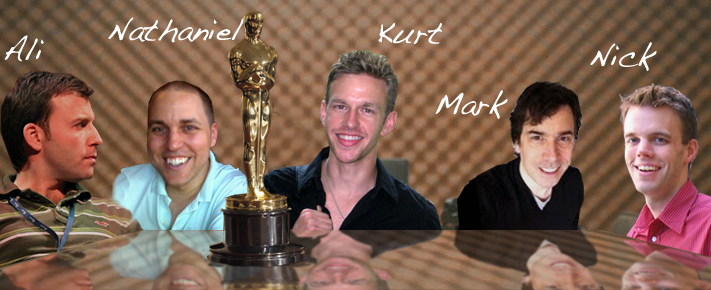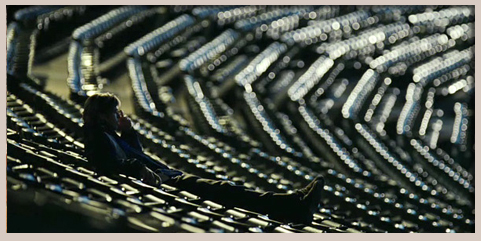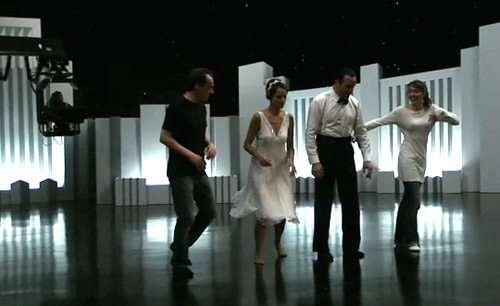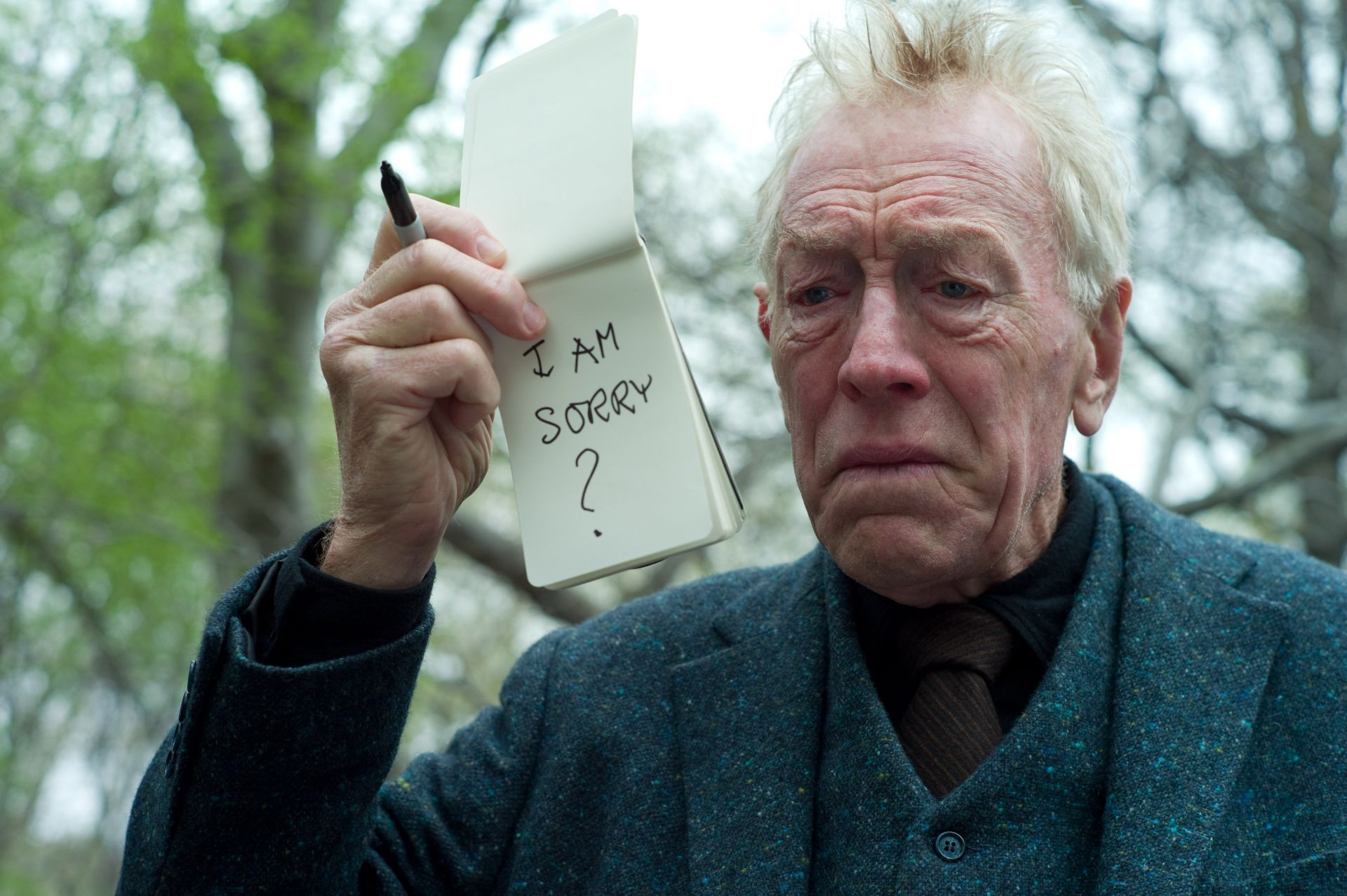Welcome to the Annual TFE Oscar Symposium! The Film Experience is proud to introduce the following guests (in alpha order): Ali Arikan chief film critic for Dipnot TV; Nick Davis Assistant Professor of English and Gender Studies at Northwestern University and the brilliant mind behind Nick's Flick Picks; Mark Harris author of the instant classic "Pictures at a Revolution: Five Movies and the Birth of New Hollywood" and Oscarmetrics columnist at Grantland; Kurt Osenlund Managing Editor at Slant Magazine's The House Next Door. And I'm Nathaniel Rogers, of course, your host here at The Film Experience. We started our conversation on Sunday night and here it is for you.

NATHANIEL: Gentlemen. If I had access to the Windsor font I'd list us all in alpha order in white lettering on the same black title card Woody Allen style so that there won't be any tragic Corey Stoll business where the Screen Actor's Guild leaves one of us out when our inevitable Best Ensemble nomination arrives. Instead, as per Nick's suggestion, we're all pictured in Tinker Tailor Soldier Spy's conference room. That indelible orange soundproof wall! How did this movie miss an Art Direction nomination?
Despite this visual trapping, I don't for one moment want anyone reading to picture us all as "gray little men" in uncomfortable stuffy suits, withholding. (I am generally too exuberant for secrets and would make a terrible spy.) Though I love Alberto Iglesias compositions for that movie, I'll readily admit that the score inside my head this very moment is more John Williams. Before the opening credits are even over, that man will hit you with the climax, and I'm excited to begin.
Feel free to change the setting at any time (the magic of cinema) but we begin at Tinker Tailor's sad little Christmas party (Don't ask me to explain why MI6 is hosting this party to which it was not invited). All the Best Pictures just walked in. Let's mingle. Who will you avoid? Who do you trust implicitly? Where do you see tension brewing. I think it only looks like Midnight in Paris is friendly with The Artist and Hugo. He secretly judges them for trusting so fully in their own nostalgia.
MARK HARRIS: I'm enjoying this party--who doesn't love wide lapels, long sideburns and ugly plastic eyeglass frames? As for who I'd avoid: The Artist, because I'm pretty sure it'd come up to me, lick my face, hump my leg, do a little dance at my feet, and instantly want to be best friends. Too much too soon--stop being so ingratiating and let me get some punch! I think I'd go seek out The Tree of Life--the cool movie glowering in the corner that nobody's talking to because it never gets invited to parties like this.
And I would be very cautious about eating those little tarts that Octavia Spencer is passing around on a silver tray.
ALI ARIKAN: I've just been talking to Midnight in Paris, who makes for a splendid company. That guy's full of pithy anecdotes about literary figures of yore.
Well, let's stay at that Christmas party at the Circus. My favourite scene of the year is set there, when a spook dressed as Father Christmas and sporting a Lenin mask, leads the troops in a rendition of the Soviet National Anthem as Smiley discovers his wife's infidelity. That's one of the two times where Smiley lets his emotions out (the other being his angry "What are you, then, Bill?" at the end of the film), and we can see how devastated he is. Oldman's nomination was well deserved. But that film was robbed on so many fronts. Art direction, as you mention, as well as direction and a supporting nod for Tom Hardy, who is magnificent.
KURT OSENLUND: Being in any sized room with Extremely Loud & Incredibly Close is, in my opinion, too close. Moneyball and I are already flashing each other von Sydow-style hand signals. 'Is this guy bothering you?' 'YES.' We meet on the dancefloor, and tap a bit with Jean Dujardin, before heading to see what Smiley is staring at out the window. Is that...Harvey Weinstein? Smooching with Oscar voters?
More including The Artist, critical wars, Moneyball, Songs, and elevating your film...
NICK DAVIS: I would have entirely schizophrenic impulses at this party. Like Mark, I'd gravitate toward The Tree of Life, aloof and devastatingly gorgeous in the corner. I'd eventually work up the nerve to say something obsequious and yet totally sincere. The verb "worship" would be involved. But its beauty and intense charisma would clearly draw other disciples. So, spotting an extremely maligned and incredibly surprised wallflower off in the corner, I would sidle right up. No, I don't want to go home with it (him? her?), but I hate seeing someone walk into a party where everyone seems to hate them already, even folks who haven't met them yet. I've got plenty of questions for this extremely awkward but incredibly interesting guest, and I'd way rather pass the time that way than around that obnoxious showboat Hugo or the smugly "sensitive" lothario in the Hawaiian shirt.
ALI: Guys, there is a horse at this party, and it just pooped in the middle of the dance floor.
MARK: Smells like manure to you, but roses to me.
ALI: Oh, I like War Horse too. And what's a Christmas party if it doesn't have some horse manure?
 Mark HarrisMARK: Not to shatter the party analogy for more than a minute, but isn't it interesting that Extremely Loud and Incredibly Close, the big outlier among the Best Picture nominees, ended up the highest grossing Best Picture nominee of the weekend? Perhaps it has actually survived the "You LIKED that!?!" backlash that every single one of the nine Best Picture nominees (except, I guess, for Moneyball) has had to endure. It is stronger than we all think? Or--back to the party analogy--is it Carrie White, unexpectedly crowned prom queen but just seconds away from further abuse? (That bucket teetering over its head is full of Uggie's pee, I fear.)
Mark HarrisMARK: Not to shatter the party analogy for more than a minute, but isn't it interesting that Extremely Loud and Incredibly Close, the big outlier among the Best Picture nominees, ended up the highest grossing Best Picture nominee of the weekend? Perhaps it has actually survived the "You LIKED that!?!" backlash that every single one of the nine Best Picture nominees (except, I guess, for Moneyball) has had to endure. It is stronger than we all think? Or--back to the party analogy--is it Carrie White, unexpectedly crowned prom queen but just seconds away from further abuse? (That bucket teetering over its head is full of Uggie's pee, I fear.)
ALI: I am not that surprised about Extremely Loud's legs. It's populist piffle, and the sort of "Oscar movie" that many people actually love. Having said that, its nomination was truly a surprise.
NICK: I'm not sure if I'm the only non-New Yorker in this conversation, but reporting from a major urban market that's nonetheless in the middle of the country, we hadn't even gotten a first look at Extremely Loud & Incredibly Close until the weekend before the nominations. Whereas we've already had a month to look DreamWorks's gift-horse in the mouth and decide we're not interested--there is one theater in Chicago still playing that movie, and it's sharing a screen with Underworld Awakening! We've had even longer to say no thanks to Scorsese's automaton. I assumed it would lead, though I'm not yet ready to call it a hit, or The Artist a flop... though I guess if Uggie were a wolf and Dujardin had punched him at the breakfast table, it would have cruised to eight figures weeks ago.
KURT: Mark, I'd say Extremely Loud is strong in the sense that Christopher Plummer suddenly has a smidgeon of competition after months of steamrolling. But other than that, I see it as Scott Rudin's consolation for missing a Dragon Tattoo Best Pic nod, and I should hope the general public won't let its nomination crown affect their thoughts on its...sugariness. I'll freely admit those noms threw me for a loop. Ali calls it "an Oscar movie," but it seemed way too manipulative, even for that label.
And since everyone's talking waste (horse poo, Uggie pee), shall we venture into the Original Song corner of the banquet hall?
 Nick DavisNICK: That's not a room, Kurt. I think it's just the garbage chute.
Nick DavisNICK: That's not a room, Kurt. I think it's just the garbage chute.
I'm aiming that comment less at the songwriters than at their nominating branch, which pretends to support an art form that it repeatedly sets up for terrible falls, as embarrassing when something like "We Belong Together" is put on a path to winning as when "The Wrester" misses a nod entirely. At what point do we recognize how little mandate there is for this category, and how totally misserved by its own voting infrastructure, and replace it with something we could really use, like Best Casting?
MARK: Best Original Song really has outlived its usefulness--it feels about as relevant to the success of a movie as Best Credit Font. I'd be happy to see them dump the Song category entirely and replace it with a music award that would allow the scores of films that use pre-existing music like Drive or Melancholia to be honored.
NICK: I'll drink to that! (I'm on my third mojito, so I'm ready to go cut in on whomever Moneyball is dancing with.)
Oh. I see - our host has been making out with Moneyball in the corner while we've all been chatting. No wonder he's been so quiet. Hey, good for you, Nathaniel! Moneyball is super cute.
KURT: I'd happily unleash the vitriol in regard to Original Song, but I don't know if I'm ready to jump on the Just-Throw-It-Out train. I'm holding out hope that they might...get it...together...someday? I have very fond memories of song performances from the Aughts. I loved that year Beyonce sang a trio of knockouts, and I LOVED the Mighty Wind duet. Is my hope the equivalent of beating a dead horse? (not you, Joey!)
NATHANIEL: Slow down boys, SAG is on. I am going to be a few hours.
MARK: Okay, I'll be quiet but "And the Actor Goes To..." is the dumbest line spoken on any movie awards show ever.
NICK: It would be so much less dumb if you could pick the Actor that was going to you.
KURT: I'll take Gael Garcia Bernal circa 2004.
NATHANIEL: I'll take Rupert Graves circa 1987. God, I'm old!
 Ali ArikanALI: Oh, Kurt. Beyonce butchered "Vois Sur Ton Chemin" that year! But, I, too, have a few fond memories of the original song performances. Amy Adams was delightful singing the numbers from "Enchanted," especially "Happy Working Song," and then there is Robin Williams' "Blame Canada," in 2000. But Three 6 Mafia's rendition of "Hard Out Here for a Pimp" was risible and emblematic of how so many of the live performances go wrong -- I believe they had to replace the word "bitch" with "witch," which turned the song inexplicably into one about occult prostitution.
Ali ArikanALI: Oh, Kurt. Beyonce butchered "Vois Sur Ton Chemin" that year! But, I, too, have a few fond memories of the original song performances. Amy Adams was delightful singing the numbers from "Enchanted," especially "Happy Working Song," and then there is Robin Williams' "Blame Canada," in 2000. But Three 6 Mafia's rendition of "Hard Out Here for a Pimp" was risible and emblematic of how so many of the live performances go wrong -- I believe they had to replace the word "bitch" with "witch," which turned the song inexplicably into one about occult prostitution.For what it's worth, I have been a champion of Mark's suggestion to have a new category honouring the use of pre-existing music in a motion picture. It would also reflect the sign of our video-essay/super-cut-making times.
NICK: Joe Reid, a regular Friend of The Film Experience, also suggested this very change in a great article he wrote last week for NPR. But before we all start rehearsing our most and least favorite Song nominations and performances of the past—and in the process sounding exacting like this year's nostalgia-addicted Academy voters—I suspect our host has other plans for us. Having taken a quick spin through Oscar's widest roster and quickly agreed that something's very rotten in the state of its narrowest one, where are you leading us next, Nathaniel? In fact, where are you?
NATHANIEL: I'm not entirely sure. I swear I just left the party for an instant and when I came back the place was a royal mess and none of you had stayed to help me clean up. THANKS.
But a better question might be "When am I?" since you've all decided to embrace nostalgia (Original Songs!) and futurism (let's add categories!) instead of staying in the now. I can't embrace either impulse. I've discussed Original Song enough this year though I keep coming up with new ways to fix it. Later!
Best Casting sounds like a wonderful idea since it's easily one of the top three most important elements in making a great film. But, like editing, it's an invisible art. We don't know what they had to work with so, like Editing, it would just be a category in which the voters grabbed at well liked movies (my guess is 4 Best Picture nominees + 1 with a huge cast. Most Casting!) and they'd call it a day. It would be largely useless and I'm guessing repetitive, acting wins paired with casting wins each time.
Which leads us to Best/Most Acting. Acting is not an invisible art (obviously) but it's also a mysterious one mixing the role itself, the star persona, collaborative boosts (the right costume, the best lines to deliver, etcetera) all into one package. Of our 20 nominees, who do you think is doing the heaviest lifting -- other than Viola Davis who seems to be a consensus pick as to Someone Who Elevated Her Movie -- and why?
ALI: Brad Pitt is the MVP of Moneyball, and without him, I doubt the film would have worked half as well. First of all, it is truly an old-fashioned, movie star performance, where Pitt is playing a "real" human being. It's a subtle, almost mysterious, turn. His Billy Beane was once destined for greatness, but has always had to make do with being the runner-up (at best). His frustrations seem to bubble up inside of him, just waiting for that opportune moment to burst. Also, it's a fun and funny performance; full of, once again, ye olde movie star charm. You can't keep your eyes off him. Billy Beane might not be my favourite character of the year (that's probably Smiley), but Brad Pitt is definitely my favourite actor, who turned Moneyball into something truly great.

MARK: I agree with Ali that Pitt is the best of this year's Best Actor candidates, but I think that's because he had to do the least heavy lifting--and that's a good thing. Pitt is supported by a terrific cast (not just Jonah Hill, but beautiful small performances by Philip Seymour Hoffman and Chris Pratt), by a director, Bennett Miller, who really understands actors, and by a screenplay that really understands language, character, and structure. So he can concentrate on the subtleties of his own work--finding just the right notes of brashness and ego and insecurity and middle-aged vanity within a well-drawn character--because's he's in a real movie, not a performance showcase.
I think when we talk admiringly of an actor doing heavy lifting, we're talking, almost by definition, about failure. Heavy lifting of the kind that Meryl Streep does in The Iron Lady or Glenn Close does in Albert Nobbs almost always happens either because the rest of the movie is insufficiently built to support the performance or because it exists ONLY to support the performance. I guess I'm betraying a bias against anything that looks like a star vehicle when it comes to the Oscars, unless that vehicle is so well-designed that it offers a whole set of pleasures of its own.
 Kurt OsenlundKURT: I'm absolutely with the consensus that Brad Pitt was just excellent in Moneyball -- the best he's ever been and the most dteserving of the Best Actor crop. I think Mark pretty much nailed my thoughts on how his work relates to the heavy lifting concept, though. To the letter, actually.
Kurt OsenlundKURT: I'm absolutely with the consensus that Brad Pitt was just excellent in Moneyball -- the best he's ever been and the most dteserving of the Best Actor crop. I think Mark pretty much nailed my thoughts on how his work relates to the heavy lifting concept, though. To the letter, actually.
When I think of heavy lifting, the acting contender who jumps out at me, tits first, is Janet McTeer. Albert Nobbs was just so airless to me, and watching McTeer was like plopping down at an oxygen bar. She was the only thing in that movie that hoisted it up to a human level, however over-animated one might consider her performance (a criticism I've certainly heard). Those two performances were like outsized takes on Jack Twist and Ennis del Mar--the relatively content figure of drastic vitality and the drastically tight-lipped closet dweller. This time, though, only one of the two had soul. I don't think this was a matter of the actress consciously elevating the film she's in, but I do think McTeer pulls off one of the biggest acts of movie theft I've seen in a while.
NICK: I'll co-sign all the love of Brad Pitt and Mark's great distillation of why Moneyball works so well. I'd duplicate most of the same sentiments as a tribute to Plummer and Beginners, another film that surprised me by having a more ambitious and unusual structure than I had anticipated, supporting its actors in every way a movie can and allowing them to support each other gorgeously, too. Tree of Life aside, I think Beginners is on a par with A Separation as the best-executed of all the non-documentary films on Oscar's roster. I'm thrilled Plummer is here for really supporting a movie and not rescuing or stealing one, as this kind of role is often asked to do.
In the spirit in which you asked your question, Nathaniel, I think my answer might be Jean Dujardin. I like The Artist less than you do and more than Mark does; not sure where Ali and Kurt stand on it. But by the time we hit the second half, where the visuals get a little more ho-hum and the plotting hits the skids in a lot of ways (and not just with Bejo careening around in that car), the finesse, dexterity, and tremendous good will that Dujardin has gifted the movie make it seem like a much more polished conception than it really is.
ALI: Having used the incredibly witty epithet The Shartist for Michel Hazanavicius' film in some of my coverage, I have, nonetheless, been an admirer, in general terms, of Dujardin's performance. I also enjoy Bejo's, even though her general attitude seems slightly anachronistic. But Dujardin does have panache, and that's probably due to that incredibly expressive face, which works wonders in a silent movie. I don't believe that he elevates the film in the same way that Pitt does Moneyball, but his performance is crucial to the eventual effect of the movie. He carries the film, but the film, in return, farts in his face. I can't get over the utterly baffling cross-cutting in the latter part of the film where Uggie does his best Lassie impression to get Joel Murray's attention as Dujardin fails to realise that the house is on fire (or is he contemplating suicide? I am hazy about the details, but the gist of my argument remains).
But he seems to have already become a parody of himself: his antics with the dog at the Globes or his singing of La Marseillaise after SAG when he was asked of the possibility of his winning an Oscar. A performance is different from the performer, obviously, but I wonder if that sort of sub-Benigniesque shenanigans won't have any retroactive effect?
NICK: "Sub-Benigniesque" Burn...
ALI: Nathaniel, I know you are a big fan of The Artist. What say you about Dujardin?
 Nathaniel RogersNATHANIEL: I'm already incredibly tired of defending The Artist. I think it's a special movie and no single film made me happier while watching it this year. People tend to use "feel good" in a derogatory way but I hardly think it's a mark against the film that it's joyous. This is why comedies have such trouble winning awards. They're always dismissed as piffles.
Nathaniel RogersNATHANIEL: I'm already incredibly tired of defending The Artist. I think it's a special movie and no single film made me happier while watching it this year. People tend to use "feel good" in a derogatory way but I hardly think it's a mark against the film that it's joyous. This is why comedies have such trouble winning awards. They're always dismissed as piffles.
I am actually disheartened each year, right about this time, by the behavior of film critics. Oscar season brings out the worst in people in that it polarizes their opinions instantly. It's the "A" and "F" syndrome when the reality is that 95% of movies fall somewhere inbetween. What would normally be something that delights or annoys becomes BEST and WORST Thing Ever and I find it lazy and reactionary. Hugo vs. The Artist and Extremely Loud vs. War Horse are perfect examples. The first combo shares a love of silent cinema but fans of Hugo seem to behave as if The Artist is an affront to cinephilia. I can't count the number of cheap shots taken at the film which seem to be operating from an ivory tower of "only the great unwashed masses who've never seen a silent would love it.". I grew up near a revival house and I have seen plenty of silent movies (one of my earliest actressexual obsessions: Louise Brooks) and I love it. Yet Hugo gets a free pass even though it's more problematic in execution.
Meanwhile Spielberg makes one of his most awkward movies yet, that never tries to earn its sentiment or bombast, but just begins as if they're a given, and is rewarded for it. Daldry shows up with a movie that definitely has its bombastic and sentimental moments but he does try to earn them (even if he fails) and he's The Devil. It's just weird to me. I always want to tell people to back away from the movies and breathe deeply.
KURT: Yeah, I'm going to chime in on The Artist: Nathaniel and I saw that together at NYFF, and we both walked out elated. Like him, I think it's a really lovely, rewarding sit, and like him, I feel the attacks against it in terms of its misrepresentation of the silent era largely miss the point of what it's trying to accomplish. That said, my love for it has cooled a bit with distance, and though I don't begrudge it its awards season performance, I'm having a tough time loving its individual parts. Dujardin, for example, only gets my passing admiration. Ditto all the inevitably nominated visual elements. The industry and technology commentary is what remains the most effective thing for me -- and yet, and yet, I surely wouldn't place it among my own screenplay favorites. So there's that.
NICK: I honestly don't think any of these movies has gotten a free pass this season, and certainly not War Horse or Hugo. Nathaniel, I see your point completely about overly emphatic fall-guy arguments, which have been prevalent, but each of the movies on the Best Picture list has had to fight some resistance. The only break in that pattern, I think, is Extremely Loud & Incredibly Close, which (I'm aware I'm repeating myself) has the obverse problem of drawing so much vituperation before a lot of people have even had a look at it... or heard its impeccable sound design and impressive score.
MARK: I'm going to back away from Nathaniel's point, because I think once we start questioning the motives of people who disagree with us about movies, we're in a losing argument. I, for instance, love War Horse and do not find it awkward or bombastic but in full control of the particular emotional language in which it's chosen to tell its story. It doesn't mean I'm a sucker--or that the people who disagree with me are haters, overreacters, or hypocrites.
NATHANIEL: That's fair and I shall spend a little time in the corner for my outburst. But haven't you ever felt that something you loved... or even something you only liked but found interesting in its failures... was greeted in a less than fair or honest way?
I've probably been most critical of War Horse and The Descendants of the nominees but I hardly feel like I've advocated setting fire to their negatives. Some of the discussions you overhear this time of year...

ALI: Well, that is interesting. Do we hate the films during this time of the year, or do we hate the arguments for films we did not like? I am splitting hairs, I know, but I do write about film. It comes with the territory.
The reason I believe "The Artist" is absolute piffle has nothing to do with its being a comedy. In fact, I agree that comedies do get the short shrift when it comes to the Oscars. For what it's worth, a film like "Bowfinger" deserved a nomination for all the right (funny, well-made) and the wrong (star-studded, navel-gazing) reasons. The problem I have with "The Artist" is that it claims to be something that it so obviously is not. It is a pastiche, which is good enough, but it is also the work of an artisan and not an artist. Its simplicity is its undoing for me, whereas that quality works wonders for others. In a year that gave us films like The Tree of Life (which didn't work for me) or Tinker Tailor Soldier Spy (which I believe to be 2011's best), I find it incredulous to hail this film as the ultimate in the roster. It does start off well enough, but, man, it crumbles, and the last fifteen minutes are "you-shot-who-in-the-what-now" incomprehensible.

READERS?
- Do you think The Artist soars or crumbles in its last act?
- Do you believe any movie has been treated unfairly this season?
- If you were at a party with the Best Picture nominees which would you hit on and which would you ignore?
